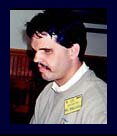
 EVEREST LIVE
EVEREST LIVE
May 12, 2001
From: Maurice Peret
2001 NFB Everest Expedition
A View from the Khumbu
At 5:00 this morning NFB Base Camp was alive with the sounds of climbers and their supporters making their way towards the Khumbu Icefall for what we hope is their final push to the summit of Mt. Everest. Seven team members will join their teammates already at Camp 2 at 21,500 feet. Weather, health, and ultimately the mountain itself will determine the precise window of opportunity for the Expedition's summit bid.
While we have a moment between radio check-in calls to attend to business down here at Base Camp, I thought I would address a number of inquiries which I have received regarding what daily life is like at Everest Base Camp. So here goes:
We generally rise between 7:00 AM and 8:00 AM as the sun begins to warm our tents or when a zealous Sherpa bangs on a cooking pan with a serving spoon announcing that breakfast is ready. This usually consists of a variety of cereals, including a Nepalese version of Co-co Puffs called "Chocos" along with warm yak milk, fried eggs and toast, French toast, or apple pancakes, and fresh coffee or tea. Radio check-in calls to the climbers occur at three-hour intervals from 6:00 AM to 6:00 PM. Both Base Camp and Camp 2, also known as Advanced Base Camp, are equipped with a radio base station. Climbers carry battery-operated, hand-held radios.
The early part of the day is the best time to take advantage of the warmth of the sun to wash clothes by hand in a large metal basin or take a shower. Our shower tent provides one of the most luxurious comforts available on the constantly moving rocky glacier that is Mt. Everest Base Camp. Hung inside the tent is a five-gallon bucket into which is poured water that has been boiled for this purpose. On the underside of the bucket is a cleverly fashioned shower head, which allows the soothing water to spray over the body and onto the flat rocks of the tent floor below. Everyone agrees that they emerge from the shower tent feeling like a brand new person.
In daytime our communications (com) tent is a buzz of activity. The film crew shoots and edits the film; the Brown University research team collects and processes data on the speech patterns of climbers at increased attitudes; and the climbers and Base Camp staff work on dispatches and manage the high volume of electronic mail that we upload and download daily. Between approximately 2:30 PM and 4:30 PM, when the sun is overtaken by clouds rising up from the Khumbu valley, it is time to put on layers of fleece, down, and Gortex as a defense against the rapidly falling afternoon temperatures. Between 6:00 PM and 6:30 PM the dinner pan is struck, and we all gather in the dining tent, which is warmed and lit by butane and propane lanterns. After that, water bottles are filled with the boiling liquid to keep our feet warm inside our sleeping bags throughout the night. In the evening the com tent becomes a movie theater as folks pile in with their sleeping bags to keep them warm while watching DVD movies on a laptop computer plugged into a boom box for good sound quality.
The night, as well as the day, is filled with the sounds of distant avalanches, nearby rock slides, and shifting and popping ice upon which our tents lie. We also live with occasional howling winds and snow falling on our tents. The protection that such a thin membrane provides against the harsh elements is remarkable.
Some of the nearby mountain peaks, such as Pumori Base Camp, offer a day's exercise, calm for restless spirits and an opportunity for excellent photographs of Mt. Everest. The lower icefall for a little ice climbing. While the climbing team is on the mountain, all focus turns to them, their well being, their progress, and the weather reports that determine what they will face. Deep respect for the mountain underlies our calculations of all factors, anticipated and unexpected, as this National Federation of the Blind team strives to reach the top. The hopes and confidence of the entire membership of the National Federation of the Blind as well as the support staff at Base Camp go toward this summit with this incredibly strong and talented team of climbers, including Erik Weihenmayer, the first blind climber to attempt such a great human feat.
I hope this helps answer some of your questions about living at Base Camp not very dramatic, but an integral part of the support of the climbing team. The other important part of this equation involves your continued support, including your contact with us. This week promises to be the most exciting part of the National Federation of the Blind-Allegra 2001 Everest expedition. Almost on our palates is the sweet taste of success. We are all anxious to bring the excitement and gratification of this experience home with us to share with you.
Together we are changing what it means to be blind.